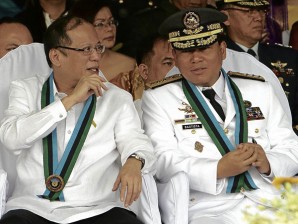
CHANGE OF COMMAND President Aquino converses with new Armed Forces Chief of Staff Lt. Gen. Emmanuel Bautista. LYN RILLON
On his assumption as chief of staff of the Armed Forces of the Philippines Thursday, Lt. Gen. Emmanuel Bautista outlined the evolving role of the soldier in the era of climate change—saving lives in the face of more violent environmental disasters.
“Indeed, in recent years, the effects of climate change have been more adverse than armed conflict,” Bautista said in his speech at the turnover of command at Camp Aguinaldo ahead of the retirement on Sunday of Gen. Jessie Dellosa.
“This is an emerging concern that we need to pay serious attention to. Your soldiers have risked their own safety, and some have even laid down their lives to save our people during natural disasters,” Bautista said.
Seven soldiers were killed and four remain missing in the aftermath of Typhoon “Pablo,” which struck Mindanao last Dec. 4, flattening communities and farms with monster winds and leaving more than 1,000 people dead and 900 missing.
In his address, President Aquino gave Bautista his immediate marching order:
“My challenge to you: the AFP, together with the national police, has the obligation to ensure that the forthcoming elections are peaceful and credible. The voice of the people should prevail and should not be gagged by gun, fear and violence.”
As deputies of the Commission on Elections during the polling, Mr. Aquino reminded the troops to follow the Constitution, and “side” with the people.
“Protect the right of the people to freely choose their leaders. Our goal: an election that is truthful, fair and lawful, from the campaign to the proclamation of the new leaders,” he said before a crowd of Cabinet and military officials, and guests who included Vice President Jejomar Binay whose party is the main opponent of the administration in the election in May.
This way, the President stressed, the government could build on last year’s gains: economic growth, the allocation of funds for social services, and the initial benefits of inclusive growth that came, he said, with the administration’s policy of good governance.
“The question now is: Do we want to continue to tread the straight path that has brought the development that we’re now reaping? The Filipino people will respond to that in the coming elections in May,” he said.
The President also paid tribute to Dellosa, who is stepping down on Sunday at the age of 56, by awarding him the Legion of Honor for his “exceptionally meritorious conduct in the performance of outstanding service” as AFP chief of staff.
Tribute to late father
It will be a year-and-a-half long tour of duty for Bautista as chief of staff, which he said he was dedicating to his father, the late Brig. Gen. Teodulfo Bautista who was killed with 34 of his men during a peace meeting with guerrillas of the Moro National Liberation Front in 1977 in Sulu.
“Our Constitution has bestowed upon us the distinct title of being the protectors of the people and the State, with the goal of securing the sovereignty of the State and the integrity of the national territory. We intend to fulfill this constitutional mandate through the following thrusts: winning the peace, securing our national territory and assisting in disaster response and rehabilitation,” Bautista said.
He urged Filipinos to join the military in “calling for an end to armed violence and in advocating for peace, to allow us to focus on the important task of securing the sovereignty of our state and the integrity of our national territory and protecting our people from the adverse effect of climate change and environmental degradation.”
Bautista said that he would continue the military’s program to upgrade its disaster rescue and relief operations capabilities.
The military, Bautista said, will also “take part in proactive measures such as environmental protection to mitigate adverse effects of disasters.”
Counterinsurgency
As the 44th AFP chief of staff, Bautista is largely credited with crafting the Internal Peace and Security Plan Bayanihan, the government’s counterinsurgency program that takes on a multisectoral approach.
“Bayanihan” attempts to lessen the need for combat operations against communist insurgents. Instead, the military partners with government agencies and the local governments to address the insurgency problem, by having “empowered communities and deepening democratic institutions.”
He called on the Communist Party of the Philippines and its military wing, the New People’s Army, to “pursue the road to peace and abandon the armed struggle.”
“As we have realized, armed struggle is not the solution to our problems,” Bautista said.
Bautista said that the signing of the Framework Agreement on the Bangsamoro with the Moro Islamic Liberation Front and the developments with the Cordillera People’s Liberation Front and the Rebolusyonaryong Partido ng Manggagawa-Pilipinas/Revolutionary Proletarian Army/Alex Boncayao Brigade were “giant strides” for Bayanihan.
“We recognize that the biggest challenge ahead of us is normalization,” he said of the peace process with the MILF. “The details of this are still being discussed by the respective peace panels, but definitely, the AFP will be fully supportive of its implementation,” he said.
Respect for human rights
Bautista also pledged that the military would respect human rights, the international humanitarian law and the rule of law as imperatives in all its undertakings.
“We shall harness the support of civil society, as well as national and multilateral monitoring bodies, in ensuring that these principles are promoted, respected and protected,” he said.
Bautista said that while the military supported the diplomatic efforts in addressing territorial issues, there was also a “need to upgrade our joint and combined operations capabilities to be able to contain any external threats.”
He vowed to continue his program of “professionalizing the military,” which he began in the Army as its commanding general.
“Soldiers shall be held to high ethical standard and strict codes of conduct … We are likewise sworn to protect our democratic institutions and processes,” Bautista said.